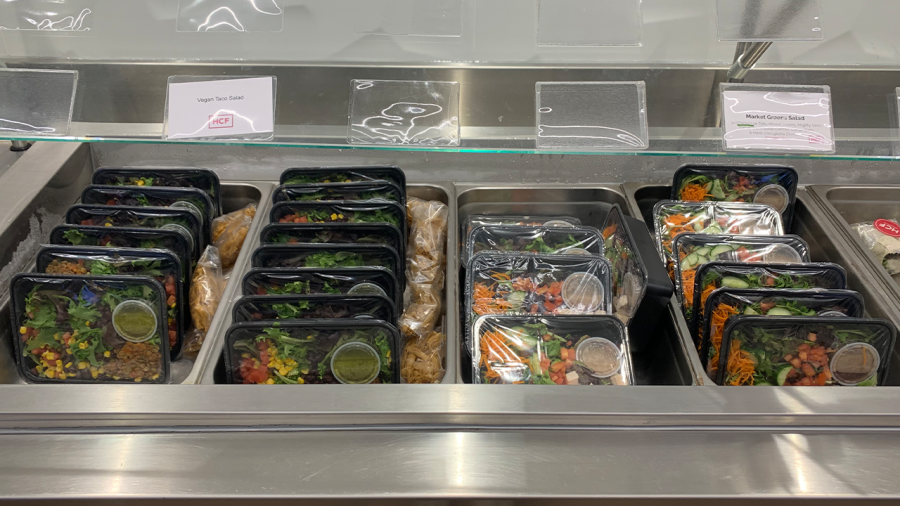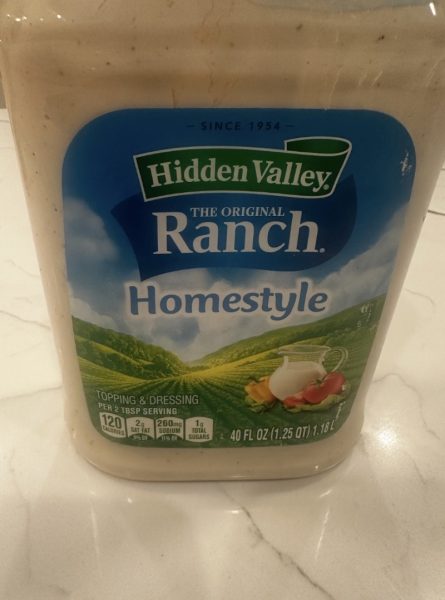Lettuce Bring Back the Salad Bar!
COVID has altered almost every aspect of society, yet there is one thing that the pandemic should not affect: the Upper School salad bar. This year, the cafeteria functions in the same way as it did before the pandemic, with the exception of pre-made to-go box salads replacing the salad bar. Latin’s previous salad bar provided students with consistent access to a satisfying lunch option, a dream for those with dietary restrictions. The salad bar also granted students a quick lunch choice, allowing them to avoid the long lines. It is time to bring it back as COVID restrictions should govern how we interact and ensure our safety, but they should not regulate vegetable consumption.
According to The Centers for Disease Control and Prevention (CDC), “Currently there is no evidence of food, food containers, or food packaging being associated with transmission of COVID-19.” In the cafeteria, students can reach their hands into a communal bowl of apples or grab silverware out of a shared container without the risk of spreading COVID, so it seems the salad bar does not pose any concerns.
Latin should join grocery stores such as Whole Foods, Jewel-Osco, and Mariano’s, which have all used the CDC’s guidance to reopen their salad bars with new safety precautions. Whole Foods’ website even announced the reopening of their self-serve stations with enhanced cleaning measures. Stores across the city continue to safely reclaim the salad bar, so Latin’s own salad bar could also reestablish with success.
Pre-packaged salads and sandwiches fill the space where the former salad bar stood, but unfortunately, they do not compare to the variety of the old salad bar. Students once had the option to craft their own salads based on a range of vegetables, proteins, and dressings, so their taste buds could go wild, combining broccoli, cranberries, and ranch together if that’s what they desired.
Although some students may not choose a salad as their first choice for lunch, the assortment of toppings at the bar made many dash to the marinated tofu, shelled edamame, or crispy tortilla chips upon entering the cafeteria. The new pre-made meals should not have to compete with the salad bar; they can coexist, given that the CDC says “there is no need to limit food service approaches to single-use items and packaged meals.”
The CDC’s advice is celebratory for students who seek a fast and satiating alternative to waiting in line for the majority of their 35-minute lunch block. Community members whose allergy or dietary restrictions make navigating lunch a challenge would also value having a new, safe option. The current prepackaged meals are not available for every dietary need. The salad bar would allow students with allergies, among other students and faculty, to create salads that suit their own dietary restrictions and make them feel comfortable knowing exactly what ingredients they are eating.
In recognizing why Latin should revive its salad bar, it is important to understand the history of America’s salad bar. R.J. Grunts, a restaurant in Chicago’s Lincoln Park neighborhood, is credited with inventing the salad bar. Rich Melman, the owner of R.J. Grunts, created the salad bar to give customers the freedom of choice and privilege to build a salad with whatever they please. Melman’s salad bar creation was praised by picky and adventurous eaters alike, as the various toppings ranged from chocolate chip cream cheese to strawberries to tuna salads to pasta. Latin, only 0.7 miles from this historic venue, has a responsibility to make Chicago proud of its salad roots. Although R.J. Grunts recently changed their bar to a digital model, they remain committed to promoting the values of the salad bar. The digital bar still includes exciting options such as sweet potatoes, quinoa, chicken tenders, and avocado. Just think of how disheartened Melman would be to hear that Latin’s salad bar was eliminated.
While Melman represents the strong population of salad bar enthusiasts, some oppose this novelty. Those who protest the salad bar commonly believe it should be eliminated to avoid sharing germs on utensils and the possibility of someone coughing on the vegetables, but these fears can be avoided. Community members must wear masks at all times, which eliminates the risk of germs spreading due to a cough or sneeze. If hand sanitizer were stationed at the beginning and end of the salad bar and students sanitized their hands at both points while wearing a mask the entire time, the system would operate safely. Gloves could also be available for students who do not feel comfortable directly touching the tongs. Everyone has different comfort levels, and it is understandable if someone chooses not to use the salad bar over their concerns, so pre-packaged meals should remain an option.
COVID has taken a lot from the Latin community, but it has no right to retract the beloved salad bar. In a socially isolated world, it is necessary to bring back the moments where community members bond over their excitement at the addition of peppers to the bar or their disappointment at the disappearance of the Balsamic dressing. Latin’s salad bar is a shared experience; lifelong friends can even be made in line. Bring back the salad bar and foster an environment where students can debate whether cucumbers or carrots are the most necessary salad topping!















































Evan Jones • Dec 2, 2021 at 6:22 pm
Now this is a movement I can get behind.